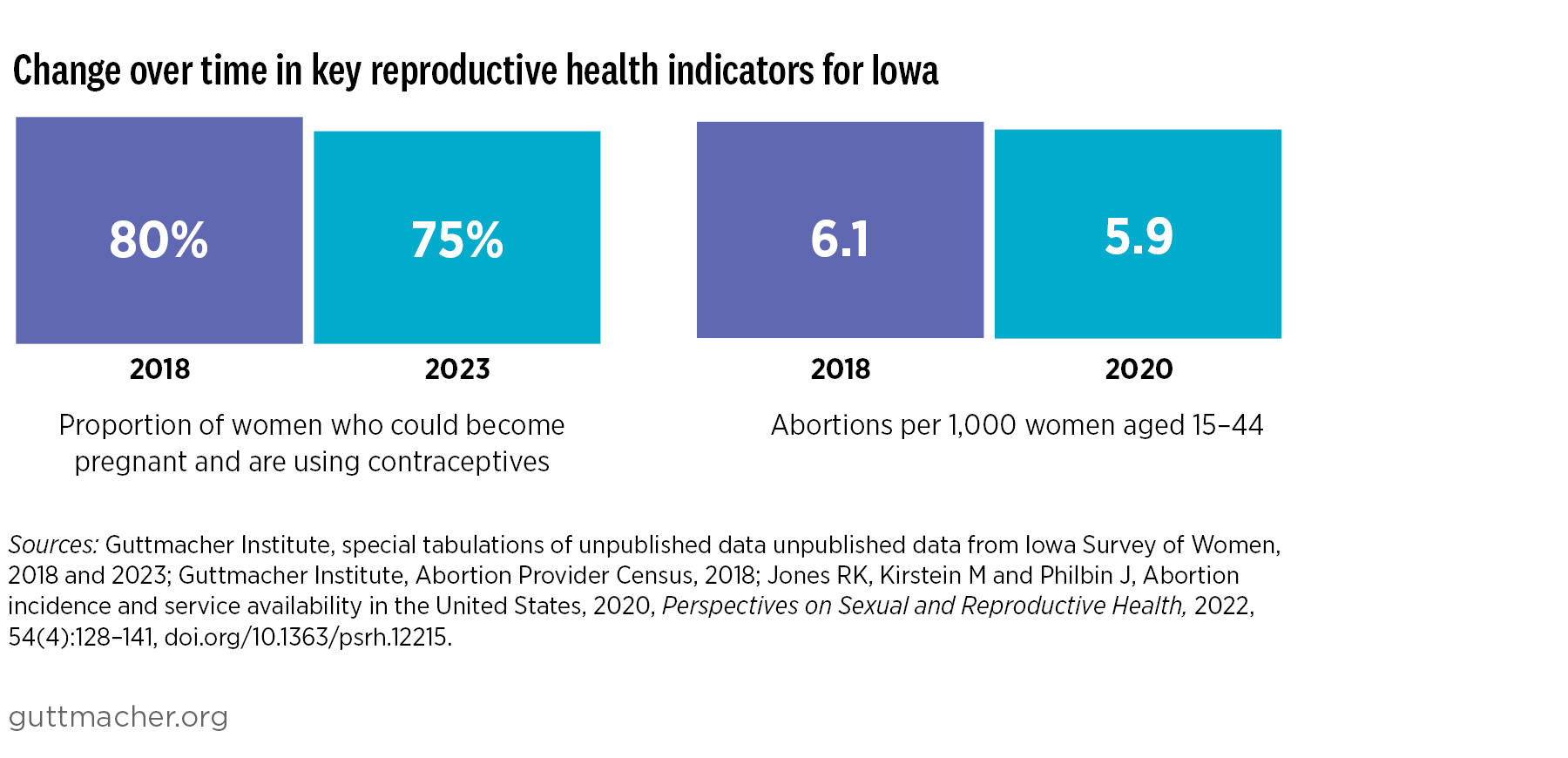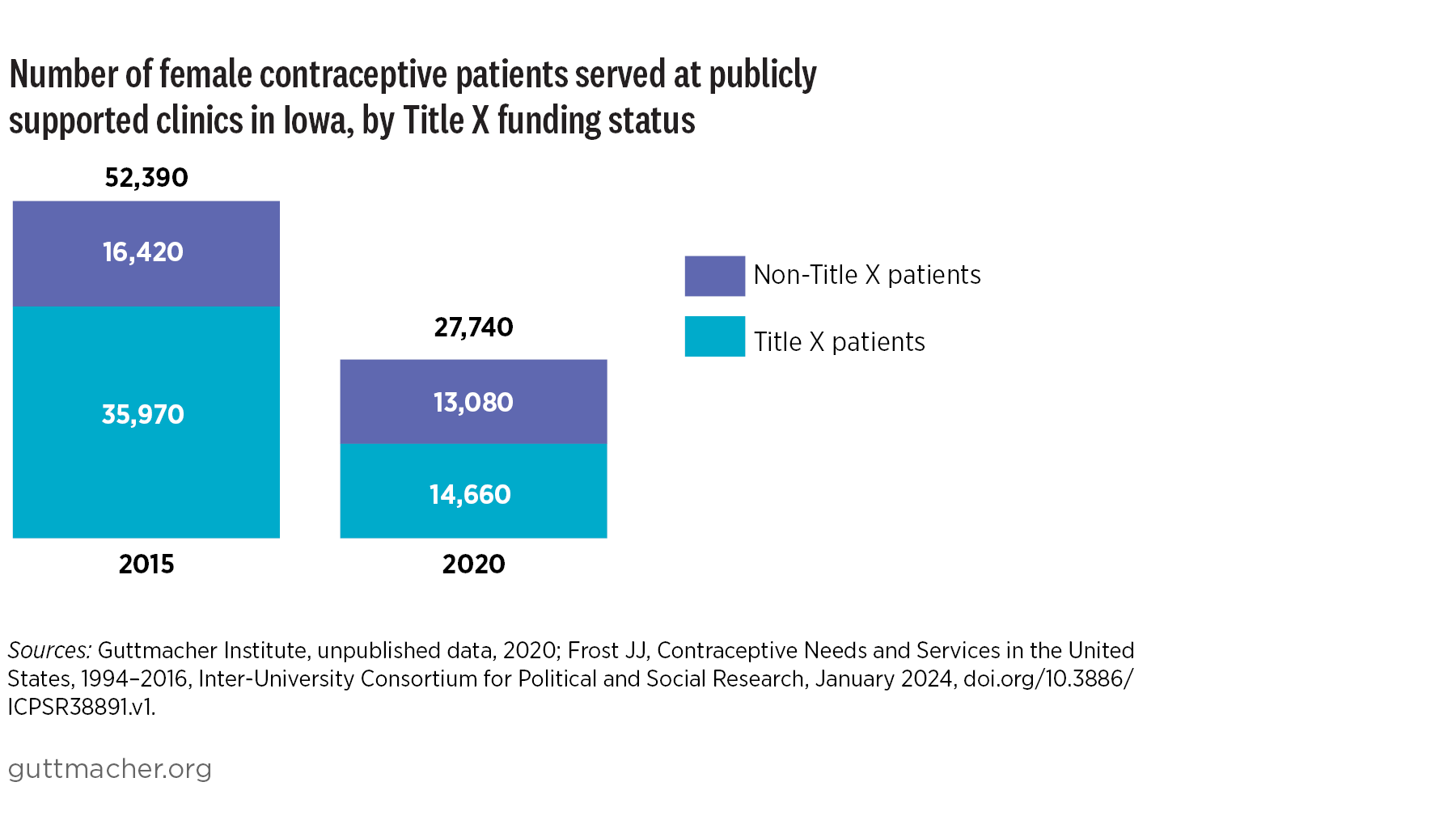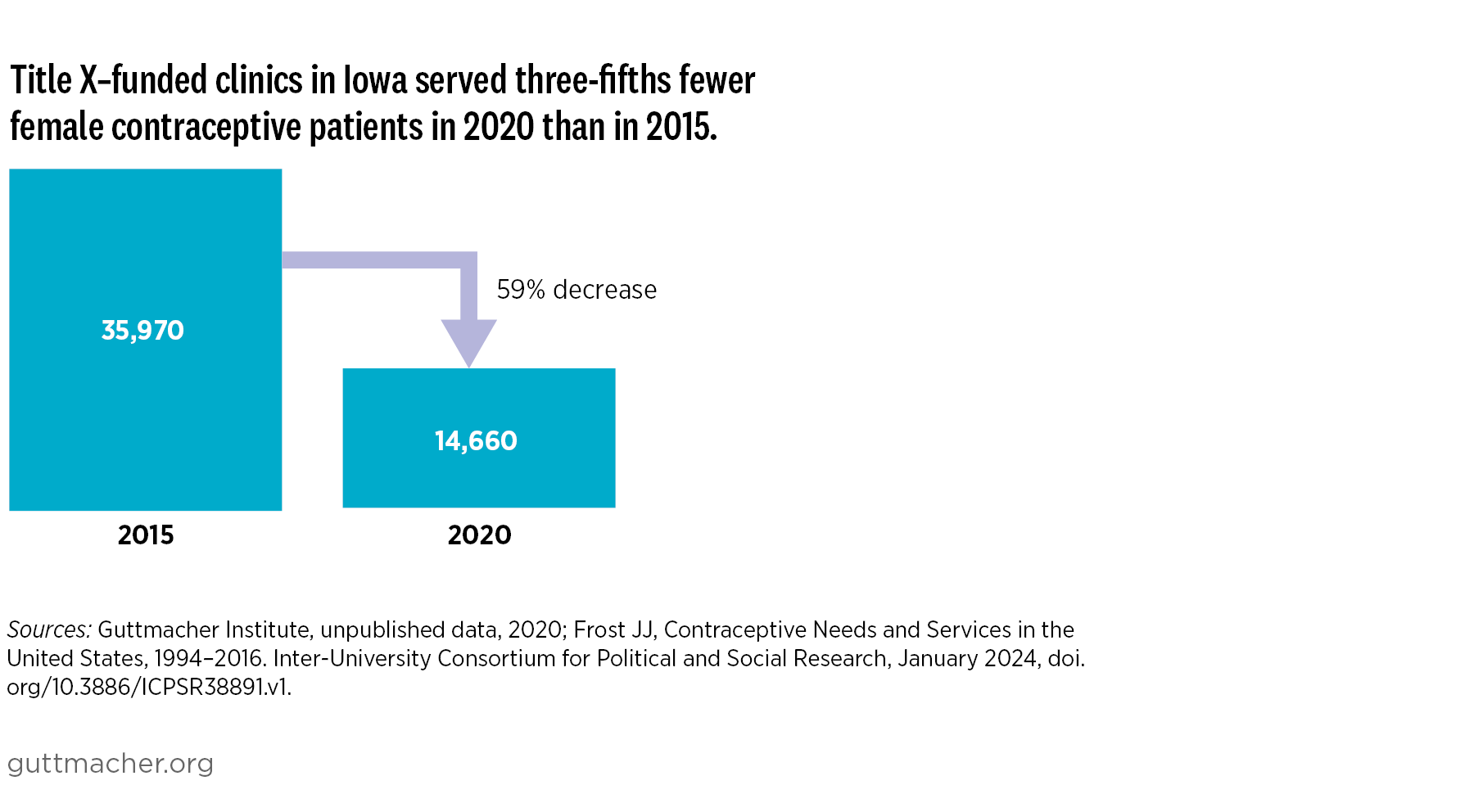The Reproductive Health Impact Study (RHIS) is a comprehensive research initiative that analyzed the effects of federal and state policy changes on publicly funded US family planning care from 2017 to 2024. The Guttmacher Institute worked with research and policy partners in four states—Arizona, Iowa, New Jersey and Wisconsin—to document the impact of these policies on family planning service delivery and the patients who rely on this care.
Iowa was selected as an RHIS focus state because the state legislature decided in 2017 to leave the federally run Medicaid family planning program and start its own network that prohibited patients from accessing care at providers with any connection to abortion.
The information in this state profile reflects the landscape in Iowa during the RHIS study period. For the most current information about the sexual and reproductive health research and policy landscape in Iowa, visit our state information page.
Overall Findings
The RHIS findings demonstrate that restrictions on sexual and reproductive health care and rights undermine people’s reproductive autonomy through negative outcomes at the patient, provider and system levels. Additional and unexpected disruptions to the landscape during the study period, such as the COVID-19 pandemic and the US Supreme Court’s Dobbs v. Jackson Women’s Health Organization decision overturning Roe v. Wade, exacerbated the harms of restrictive policies.
The main study findings include:
- All types of sexual and reproductive health care are inextricably linked, and restrictions on sexual and reproductive health care have broader implications.
- Programs and policies that support person-centered care and focus on sexual and reproductive health equity are key to ensuring reproductive autonomy for all patients.
- Cost is a significant barrier to patients’ ability to access care and achieve reproductive autonomy.
- Person-centered contraceptive care is essential because contraceptive preferences vary.
- Publicly funded family planning programs, including Title X, are critical to making contraceptive services affordable.
Iowa’s Sexual and Reproductive Health Landscape, 2017–2024
In 2020, Iowa was home to about 650,000 women of reproductive age (15–49), 31% of whom had incomes below 200% of the federal poverty level.1 In the same year, about 187,000 women in Iowa were considered likely to have a need for publicly supported contraceptive care.2 Additionally, 5.6% of women in Iowa aged 15–49 were uninsured in 2019, compared with a national average of 12%.
Who Gets Publicly Funded Family Planning Services in Iowa?
During the study period, the number of female contraceptive patients served at publicly funded clinics in Iowa decreased. A publicly funded clinic is a site that offers contraceptive services to the general public and uses public funds (federal, state or local funding through programs such as Title X, Medicaid or the federally qualified health center program) to provide free or reduced-fee services to at least some clients.
In 2020, about 28,000 female contraceptive patients were served at publicly funded family planning clinics in Iowa, a 47% decrease from 2015. Patients younger than 20 made up about 5,400 of this group, a 51% decrease from 2015.2
Only 15% of women in Iowa considered likely to have a need for publicly supported contraceptive care were served by publicly funded clinics in 2020, down from 27% in 2015.2
Where Do People Get Publicly Funded Family Planning Services in Iowa?
The total number of publicly funded family planning clinics in Iowa decreased by 25% from 2015 to 2020, from 88 to 66. Of that total, the subset of clinics receiving Title X funding decreased by 38%, from 47 in 2015 to 29 in 2020, and the number of female contraceptive patients served at Title X clinics also significantly decreased over the study period.2
What Family Planning Policies Changed in Iowa During the Study Period?
State and federal policy changes enacted during the RHIS study period disrupted the publicly supported reproductive health care system in Iowa. In 2017, the Iowa legislature voted to defund Planned Parenthood and reject federal Medicaid dollars for family planning, implementing instead a state-funded program that removed funding eligibility from health care sites that provided abortion care or referrals. In 2019, the Trump-Pence administration implemented a series of changes to the Title X program’s administrative regulations that included a ban on abortion referrals, required physical and financial separation of Title X–funded activities from any related to abortion, and mandated coercive counseling standards for pregnant patients.
As a result of this “domestic gag rule,” all Planned Parenthood affiliates left the Title X network later that year, although Planned Parenthood North Central States continued to offer family planning services in Iowa via other funding streams. In 2021, the Biden-Harris administration’s Title X rule went into effect, revoking the 2019 rule and restoring the Title X national family planning program.
Patients’ Experiences of Reproductive Health Care in Iowa
The restrictive state and federal policy changes enacted from 2017 to 2024 negatively impacted Iowa residents’ ability to access reproductive health care.
Barriers to Accessing Care
The Iowa legislature’s 2017 decision to leave the federal Medicaid family planning program and establish a state-run program that excluded clinics associated with abortion care from funding disrupted access to sexual and reproductive health care in the state. In the two years following this shift, the share of patients at publicly funded clinics in Iowa who had not recently received contraceptive care increased from 32% to 62%, and the share of patients not using any contraceptive method increased from 9% to 15%.
Shifts in federal funding for family planning care under the Title X gag rule also negatively affected people’s ability to access care. According to research findings, Iowa patients who sought publicly funded family planning care at sites that left the Title X system after the gag rule were less likely to have received recent contraceptive care than those who sought care at sites that remained in the Title X system or were never in it. Patients in the first group were also less likely than those in the second group to have been using a provider-involved method (such as birth control pills, patch, ring or shot) and to report being satisfied with their contraceptive method.
Patients in Iowa experienced pervasive cost-, access-, and quality-related barriers to contraceptive care. When they were unable to overcome these barriers to access their preferred contraceptive method, they switched to methods that were not ideal for them or used no method at all.
One Iowa contraceptive patient described cost barriers to care: “So now I am debating, do I get off birth control or do I stay?…I've gone through a couple of different ones trying them out, but now, I don't know if I can necessarily afford it, because I don't make that much.…I would need to take my health insurance, because I can't go uninsured, but as far as paying $40 for birth control, I'm not sure.…I just feel like that's very expensive.”
Another patient reported: “I asked about the coverage and if it was changed or what had changed, and they said yeah, all of our funding got cut and birth control is like this much. I asked if the appointment itself would end up costing me money and then she said, yes it would end up costing me money, and I canceled my appointment.”
Restrictive state and federal policies undermine person-centered care, the patient-provider relationship and patient health outcomes. Person-centered care—health care responsive to an individual patient’s preferences and values—is a central tenet of reproductive autonomy. In 2019–2020, fewer than half (48%) of women aged 18–44 in Iowa reported receiving “excellent” person-centered contraceptive care in the previous year.3
Although state-specific data are not available, national findings indicate that restrictive sexual and reproductive policies compound existing inequities. Therefore, the effects of the policies implemented during the RHIS study period are likely to have fallen particularly hard on marginalized groups in Iowa, including communities of color, people with low incomes and immigrant communities.
Effects of COVID-19 and Dobbs on Care
The COVID-19 pandemic further exacerbated the harmful impact of restrictive sexual and reproductive health policies. Between May 2020 and May 2021, 38% of survey respondents at publicly supported health centers in Iowa reported that they were unable to access or delayed accessing sexual and reproductive health care, including contraceptive care, because of the pandemic. Respondents who had experienced financial instability during the pandemic were more likely than those who had not to report pandemic-related delays in accessing sexual and reproductive health care.
Abortion-related policy changes during the study period also impacted people’s ability to access contraceptive care. In 2022–2023, following the Dobbs decision that overturned Roe, 10% of reproductive-aged women in Iowa reported having trouble or delays in accessing their preferred contraception, compared to 7% in 2021.
Reproductive Health Care Providers’ Experiences in Iowa
Restrictive state and federal policies disrupt providers’ ability to center and meet patients’ needs. They also increase existing inequities in sexual and reproductive health care, because these policies disproportionately impact marginalized groups.
Barriers to Providing Care
The state and federal policy changes enacted during the RHIS study period hindered publicly funded family planning providers in Iowa from offering patient-centered care. They harmed clinic finances, providers’ ability to protect patient confidentiality, contraceptive counseling and service provision, and pregnancy options counseling.
Providers at clinics that opted to join or stay in the Title X national family planning program after the gag rule was enacted were required to prioritize fertility awareness–based methods and include parents in care decisions for minors (potentially compromising patient confidentiality). In addition, they were no longer able to provide comprehensive pregnancy options counseling.
One Iowa provider reported: “There's a huge emphasis on fertility-based methods and the natural family planning in the last year or two or more, and kind of shifting away from oral contraceptives or our normal…contraceptives. That was not something that I was taught when I was in nursing school. It's not something I was taught when I started working here, so that's a huge change for us.”
As a result of decreases or restrictions in funding, publicly funded family planning providers in all four RHIS study states—Arizona, Iowa, New Jersey and Wisconsin—had to rework payment options for patients. In some cases, they helped patients who would not otherwise be able to afford care access other government, clinic or donor funding sources.
One Iowa provider reported: “So, we lost Title X funding.…So, we went from being able to give our patients an up to 100% discount down to a 40% discount based on income.”
Another shared: “The sliding-scale fee has continued to change.…We’ve had to ask more from our patients because we can’t afford to stay open and see patients at such a great discount; we just can’t afford it ourselves.”
Changes in Title X Funding
Between 2018 and 2021, 31% of Title X–funded clinics in Iowa left the Title X family planning program, likely because of the gag rule. In the same period, the share of publicly funded clinics providing comprehensive contraceptive counseling decreased.
COVID-19 and Reproductive Health Care Provision
The COVID-19 pandemic further complicated Iowa providers’ ability to provide person-centered sexual and reproductive health care during the study period. Family planning providers adapted their operations—including by implementing additional safety protocols, shifting service delivery and staffing to meet patient needs, and expanding telehealth services—to continue providing care during the pandemic.
Iowa’s Post-Roe Abortion Policy Landscape
Restrictive abortion laws can affect people’s ability to access contraceptive services and family planning providers’ capacity to provide contraceptive and other sexual and reproductive health care. Whether or not a reproductive health care provider offers abortion services, the ripple effects of abortion policies impact all types of care.
Days before the Dobbs decision, the Iowa Supreme Court ruled that there is no right to abortion under the state constitution, and in July 2024, a six-week abortion ban went into effect in the state. The most current information about abortion-related policies in Iowa is available on Guttmacher’s interactive map of US state abortion policies.
State Partners
The Guttmacher Institute partnered with the Family Planning Council of Iowa, Planned Parenthood North Central States, and other Iowa-based research and policy partners for the RHIS. Additional information about reproductive health-related data and policies in Iowa can be found in the following resources:
- Family Planning Council of Iowa
- Planned Parenthood North Central States: Research
- American Civil Liberties Union: Iowa
NOTES
1. Throughout this profile, we use the terms female and women to refer to individuals who may have the ability to become pregnant. However, not everyone who has the capacity to become pregnant identifies as female or as a woman. A limitation of the data sources used in our analyses is that they do not provide further detail on the sex or gender identity of respondents.


